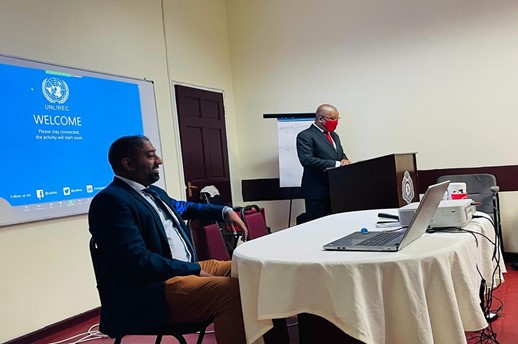From 27 to 30 September 2022, the United Nations Regional Centre for Peace, Disarmament and Development in Latin America and the Caribbean (UNLIREC), in collaboration with the Government of Guyana, held the National Ballistics Intelligence Management Course and a Monitoring and Evaluation Roundtable Meeting of the National Action Plan on firearms (NAP). Both activities contribute to reducing the effects of armed violence and gun crimes by strengthening the capacities of national officials to respond to them.
The National Ballistics Intelligence Management Course was opened by Mr. Robeson Benn, Guyana’s Minister of Home Affairs and Chargé d’Affaires a.i. from the Canadian High Commission, Mr Jake Thomas, who emphasized the importance of strengthened national capacity to combat illicit trafficking and firearms use, and the value of working as a region in a more coordinated manner.
The three-day training course covered topics such as firearms and ammunition identification and classification, chain of custody, which includes all procedures to protect and ensure the authenticity of evidence at crime scenes, as well as the analysis and management of ballistic information and intelligence, which could reduce impunity and prevent armed violence.
Twenty-six officials participated in the course, including five women, representing the Ministry of Home Affairs, Guyana Police Force Force, Guyana Revenue Authority and Guyana Forensic Science Laboratory involved in the investigation and prosecution of firearms crimes.
Following the course, a Monitoring and Evaluation (M&E) roundtable meeting was held on 30 September, to advance Guyana’s National Action Plan on Firearms (NAP). Guyana’s NAP is part of the implementation of the Caribbean Firearms Roadmap, supported by UNLIREC and CARICOM IMPACS, to implement actions against illicit firearms trafficking and make the Caribbean a safer region.
Six national representatives, including two women, from the Ministry of Home Affairs, Ministry for Foreign Affairs and International Cooperation, Guyana Police Force, Guyana Forensic Science Laboratory, Office of the Director of Public Prosecutions and Guyana Revenue Authority took part in the roundtable.
During the roundtable, UNLIREC conducted the baseline assessment with Guyana, gathering detailed responses to a matrix of questions. This process allows States to have a robust foundation from which to measure their progress over the course of the Roadmap initiative. UNLIREC also presented the Monitoring and Evaluation Framework for the Caribbean Firearms Roadmap, which will allow States to track progress on their NAPs and allow monitoring of the implementation of the Roadmap across the region.
The National Ballistics Intelligence Management Course and M&E roundtable contribute to the implementation of Goal 1, “Reinforce regulatory frameworks governing firearms and ammunition” and Goal 3, “Bolster law enforcement capacity to combat illicit firearms and ammunition trafficking and their illicit possession and misuse, and ammunition, and ultimately reducing firearms-related crimes and armed violence in the Caribbean” of the Caribbean Firearms Roadmap.
This activity was funded by Canada and supports the implementation of international arms control instruments, in particular the UN Programme of Action on Small Arms.





